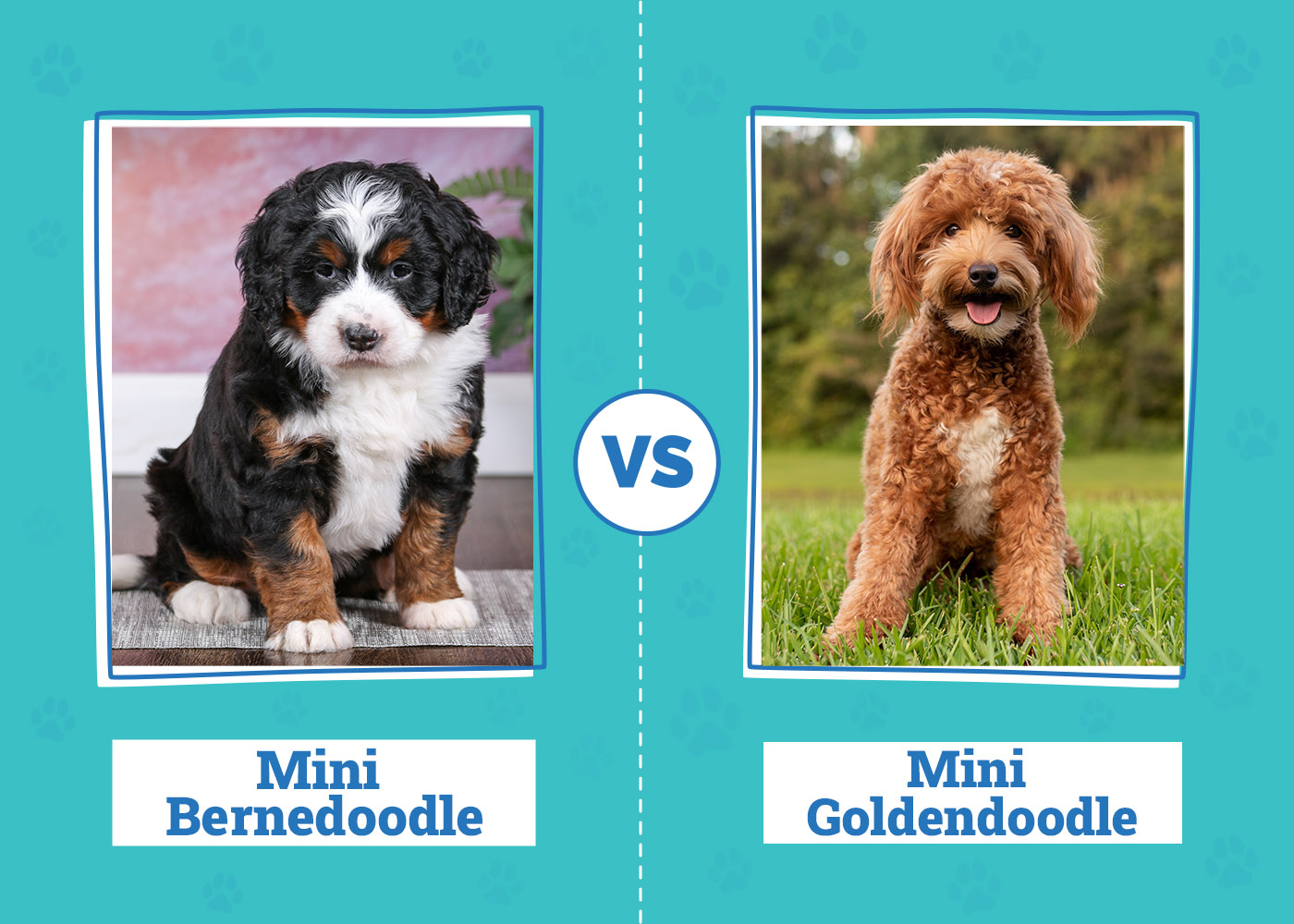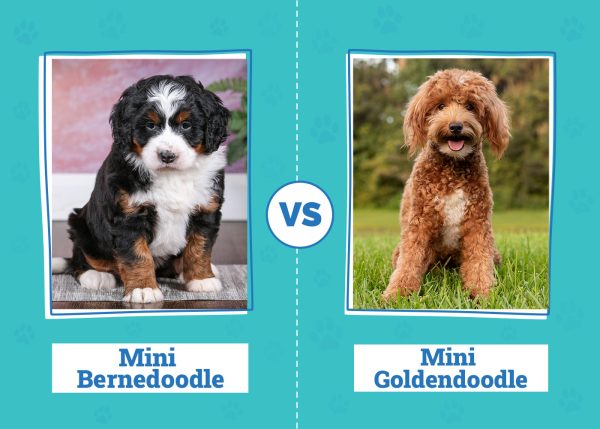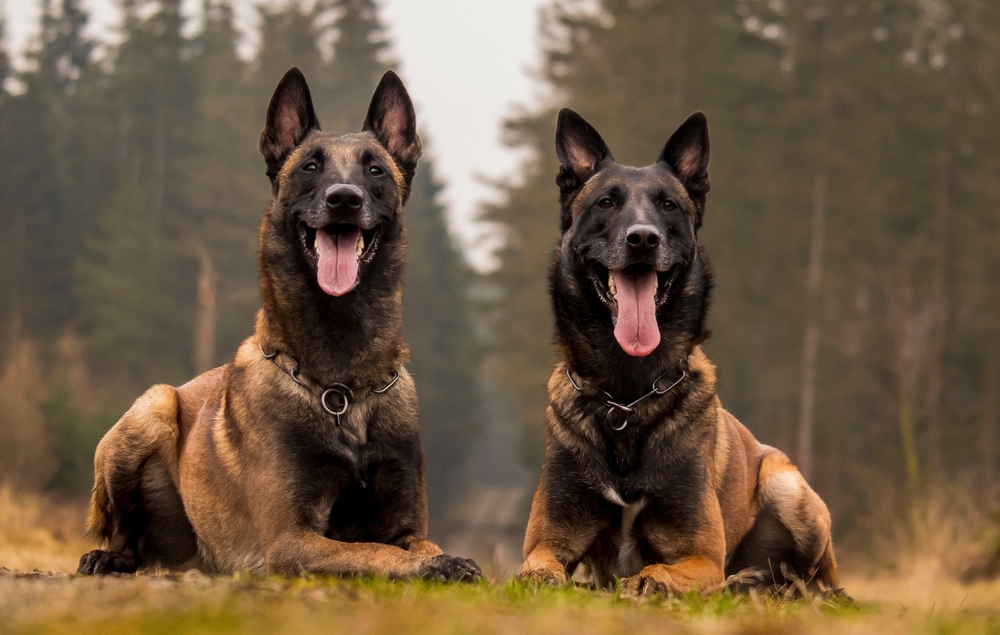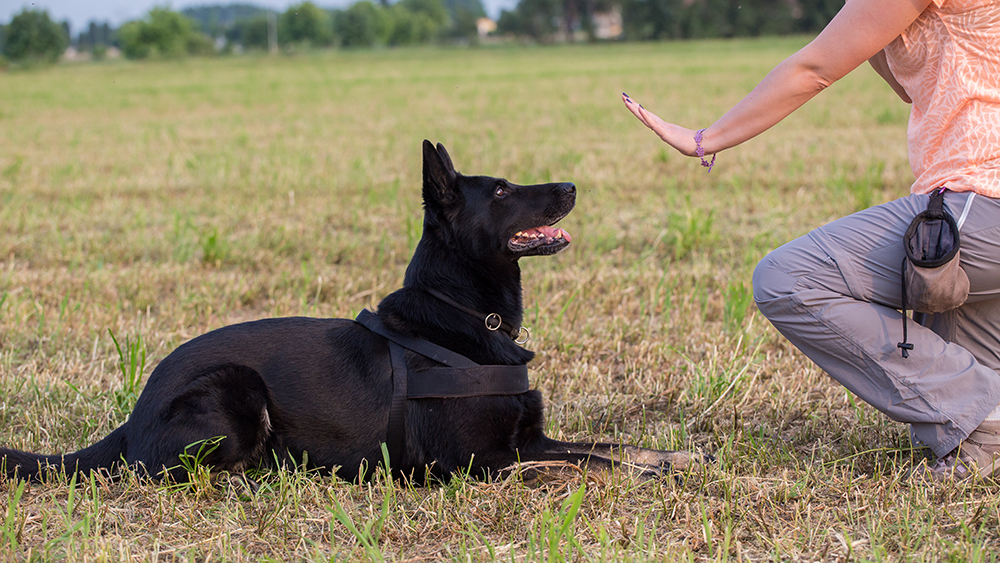Click to Skip Ahead
Mini Bernedoodles and mini Goldendoodles are mixed breeds, which means that they can vary a lot. You never know which traits a mixed-breed puppy is going to inherit. They may be like one parent, like the other, or somewhere in between.
A Bernedoodle that inherits more traits from a miniature Poodle will be almost identical to a Goldendoodle that takes after the miniature Poodle. However, if the puppies favor the Bernese Mountain Dog or Golden Retriever, they’ll look much different.
In this article, we’ll discuss the differences between the miniature Bernedoodle and the miniature Goldendoodle to help you decide which crossbreed is ideal for your home.
Visual Differences

At a Glance
- Average height (adult): 18–24 inches
- Average weight (adult): 25–49 pounds
- Lifespan: 10–12 years
- Exercise: 60 minutes per day
- Grooming needs: Moderate
- Family-friendly: Yes
- Other pet-friendly: Yes
- Trainability: High
- Average height (adult): 13–20 inches
- Average weight (adult): 15–35 pounds
- Lifespan: 10–12 years
- Exercise: 60 minutes per day
- Grooming needs: Moderate
- Family-friendly: Yes
- Other pet-friendly: Yes
- Trainability: High
Mini Bernedoodle Overview
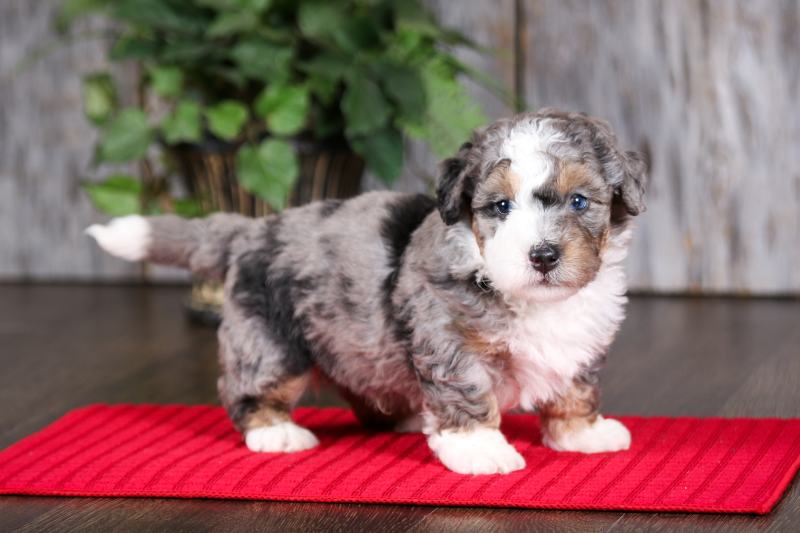
The Mini Bernedoodle is a mix between a Bernese Mountain Dog and a Miniature Poodle. They’re friendly, intelligent, and adorable. They often have a low-shedding coat, but not always. Because they’re intelligent, they’re relatively easy to train.
Physical Characteristics
Mini Bernedoodles are typically small to medium-sized dogs. They are 18–24 inches tall and can weigh up to 50 pounds. Therefore, they aren’t always as “mini” as many people consider them.
They can come in many colors, though black, white, and brown are the most common. They also have a range of coat types, and some are not low-shedding. It depends on which parent they take after.
Temperament
Mini Bernedoodles are affectionate and loyal pets. They get along well with children and other pets, especially when socialized properly. For this reason, they can make great family dogs.
If they follow in the footsteps of their Poodle parents, they will also be intelligent and easy to train. They love to learn new things and demand plenty of mental stimulation. They do best when given a job to do. If they are not mentally stimulated, they can become bored and destructive.
Health
As a mixed breed, the mini Bernie is relatively healthy. They can experience joint problems, especially if they are on the bigger side. Hip dysplasia and elbow dysplasia can be inherited from their parents. Sometimes, they may also develop eye problems, many of which are genetic.
It’s vital to purchase a Bernedoodle from a trusted source. You may find a reputable Bernese Mountain Dog breeder who specializes in crossbreeding, or you can visit a rescue center or shelter. If you see online ads for free or inexpensive dogs, be cautious. Some private sellers try to get rid of unhealthy dogs, and some websites are scams.
Grooming
Mini Bernedoolds may shed very little or a lot. The grooming they need largely depends on their coat type. Some may need to be brushed daily and rarely trimmed, while others may need to be trimmed every few weeks to keep their coat in check. It all depends on which parent they take after.
Either way, they have significant grooming requirements. Plan on brushing them regularly, and be prepared to spend money on professional grooming.
Activity Needs
Mini Bernedoodles are usually active dogs. They require daily exercise and do their best in active families for this reason. However, they only need about 60 minutes of exercise a day, which is less than some other breeds.
Also, they’re smaller dogs, and they don’t need large yards if they get enough exercise.
Training
The mini Bernedoodle is usually easy to train. They’re intelligent and eager to please, so they can learn a variety of tasks with ease. They’re fine for new dog owners, but you should plan on spending a considerable amount of time training them.
Suitable For:
If you’re looking for a friendly, hands-on dog, the mini Bernedoodle is a good choice. They may be cute and fluffy, but they are not lapdogs. They need a lot of exercise and mental stimulation, and many owners underestimate how much time these dogs require each day.
Mini Bernedoodles are best for active families who don’t mind spending an hour a day exercising them. Training is pretty straightforward, so experience isn’t necessary.
Mini Goldendoodle Overview
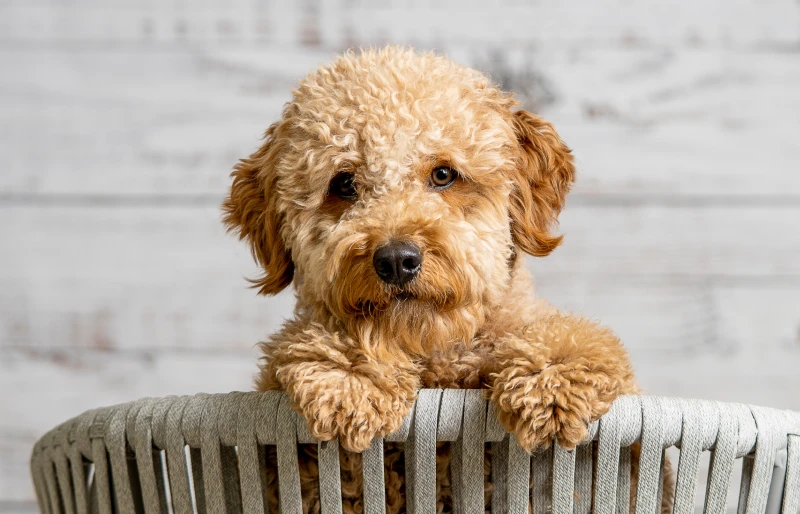
Mini Goldendoodles are a cross between a Golden Retriever and a miniature Poodle. They’re fairly similar to mini Bernedoodles, as they share one parent. They’re known for their friendly nature and low-shedding coat. However, just like any mixed breed, their traits can vary greatly.
Physical Characteristics
Mini Goldendoodles are usually smaller than mini Bernedoodles. They weigh 15–35 pounds and are 13–20 inches tall. Their coats can vary a lot. Some have straight fur that sheds considerably, while others have a wavy or curly coat. It just depends on the traits they inherit.
Their color can also vary widely. They may be red, caramel, gold, cream, or apricot, among other colors.
Temperament
Temperament is partially genetic. However, how you raise the dog is important, too. Typically, Goldendoodles are rather friendly when properly socialized. They can get along well with other children and pets and are relatively easy to train, thanks to their intelligence.
In many cases, their temperament matches what most families seek in a companion dog.
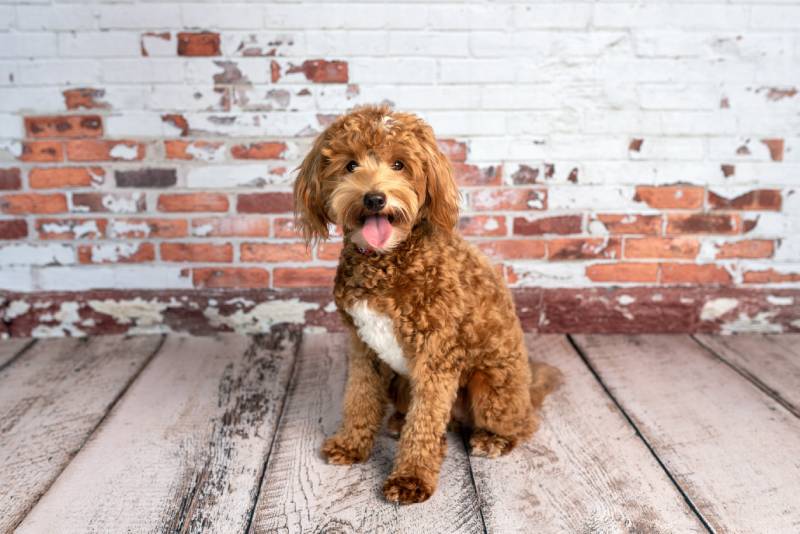
Health
Like most mixed breeds, the mini Goldendoodle is pretty healthy. However, they can have the same health problems as their parent breeds. These usually include joint issues and eye problems, both of which have genetic factors.
It’s vital to meet the dog you plan to adopt and avoid making purchases online with unknown sellers. Designer dogs have been incredibly popular since the 1990s, and since they cost more than dogs that aren’t intentionally bred, some sellers are more concerned with profits than the health of their dogs.
Grooming
As you may expect, the mini Goldendoodle requires regular grooming to keep their coats healthy. While their coat type can vary, they’ll almost always need daily brushing. For those with straight fur, the brushing helps remove loose fur. For dogs with curly hair, it helps prevent tangles. You must choose a brush that works well for your dog’s coat type.
In many cases, Goldendoodles need the occasional trim. Some dogs may be able to go months without professional grooming, but others may need to be trimmed every six weeks.
Activity Needs
The Poodle and Golden Retriever are pretty active dogs, so you can expect the Goldendoodle to be pretty active, too. They usually need at least an hour of exercise every day. Daily walks are vital, and you should also consider playing fetch and other games to stimulate their minds and bodies.
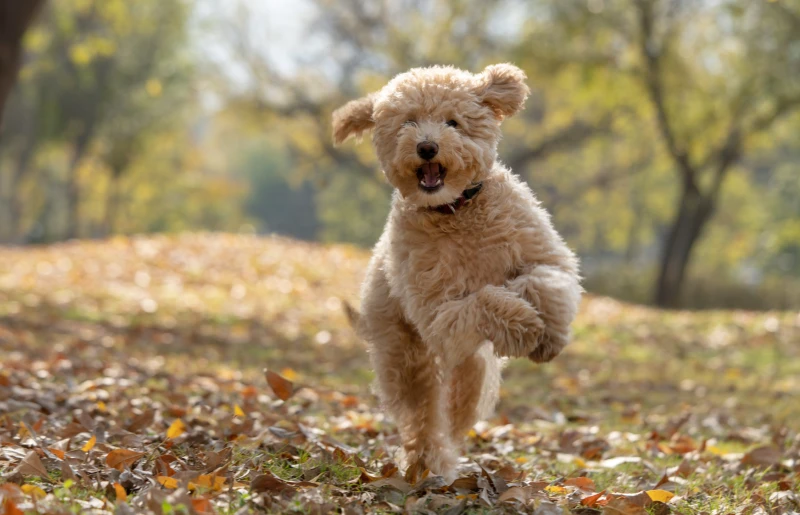
Training
Because Goldendoodles are intelligent, they’re pretty easy to train. They’re eager to please and want to make their owners happy, which makes the training process more straightforward. They also perform well in obedience and agility competitions. Mini Goldendoodles require quite a bit of mental stimulation, though. Therefore, they don’t do well when left at home alone for long periods, as they can easily become bored.
Suitable For:
Goldendoodles make excellent pets for active families. If they are socialized properly, they’re a great choice for families with kids of all ages. They’re energetic and love interacting with their family, but they’re not cuddly lapdogs.
Mini Goldendoodles are suitable e for new dog owners who are willing to train them and provide enough exercise to keep them happy and healthy.
Which Breed is Right for You?
The miniature Bernedoodle and the miniature Goldendoodle are similar in many ways, and it can be challenging to decide which is better for your home. It depends largely on what you are looking for and your lifestyle. Both dogs require a lot of work, are good with children, and tend to be friendly.
Mini Goldendoodles are slightly smaller than mini Bernedoodles. However, sizing can vary. Goldendoodles may also be more energetic and playful, while Bernedoodles are often calmer. However, because these are a mixed breed, you never quite know what you’ll get. If you’re looking for a very particular kind of dog, a purebred is another option. They tend to have their traits more defined than a mixed breed, which can inherit traits from either parent.
See Also:
- Cockapoo vs Mini Goldendoodle: The Differences (with Pictures)
- Mini Goldendoodle vs Goldendoodle: Differences Explained (With Pictures)
Featured Image Credit: Top – JasonYoder, Shutterstock | Bottom – Marcello Sgarlato, Shutterstock

